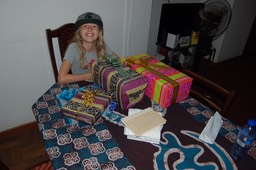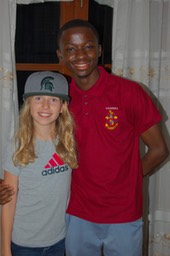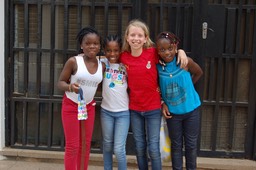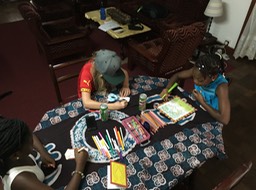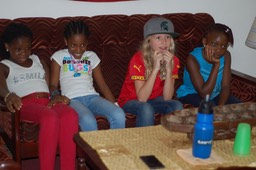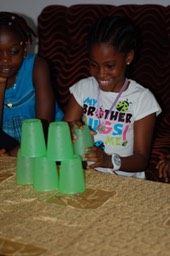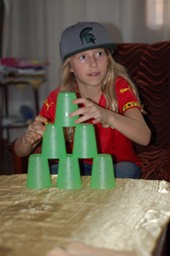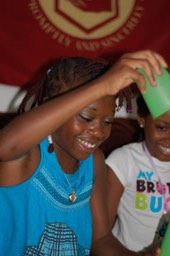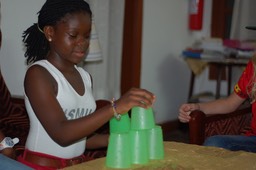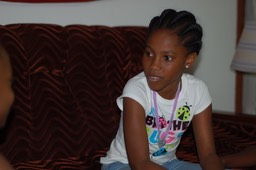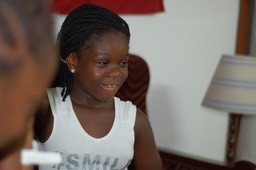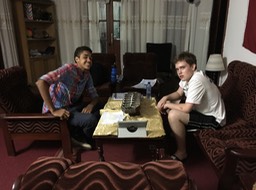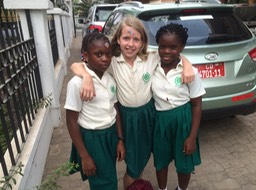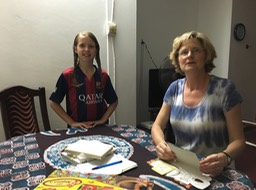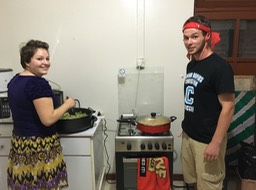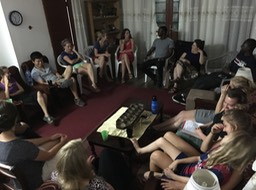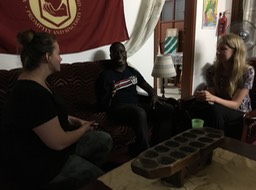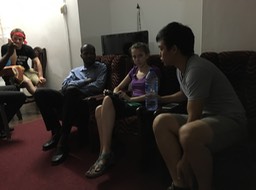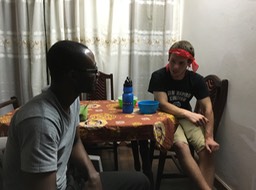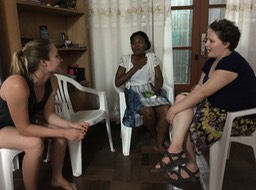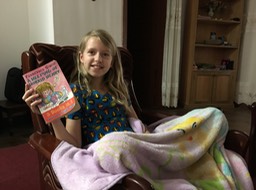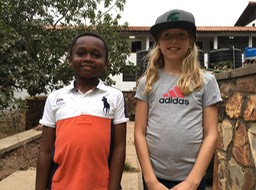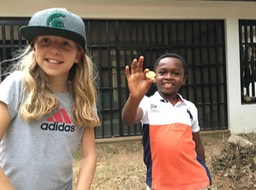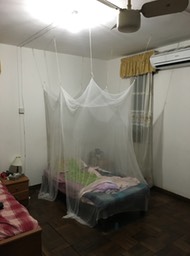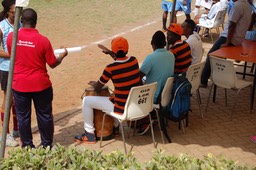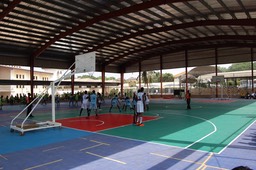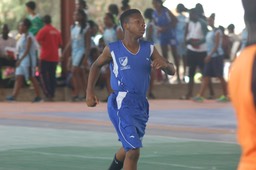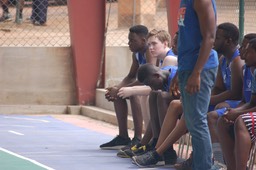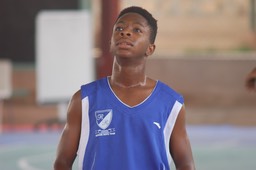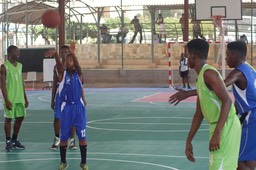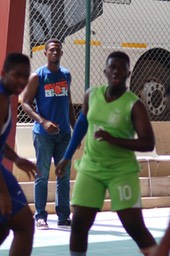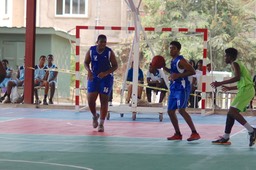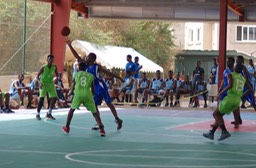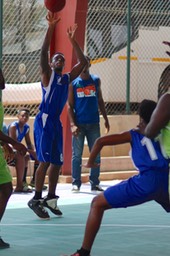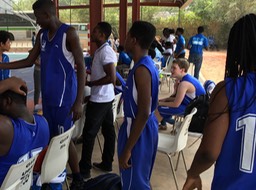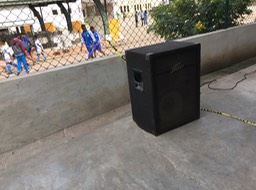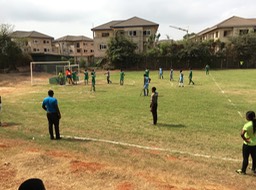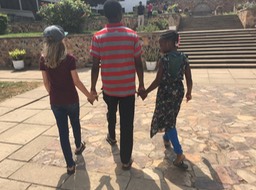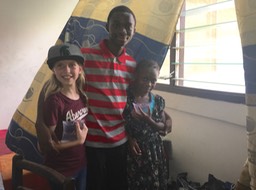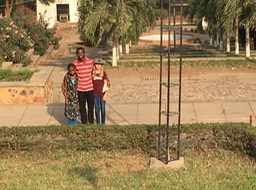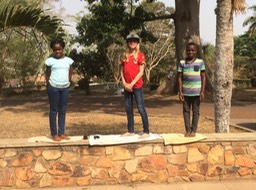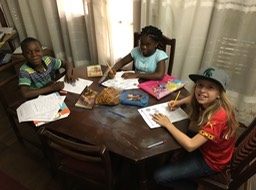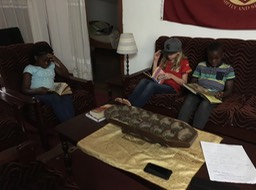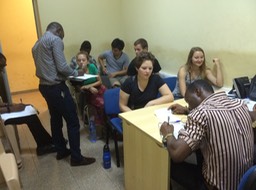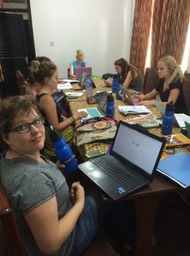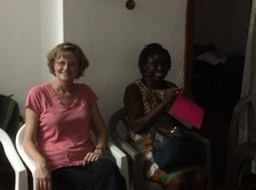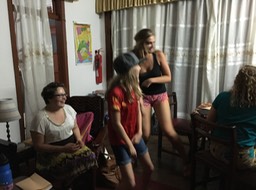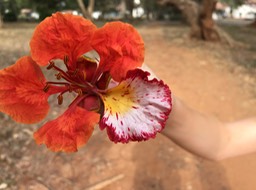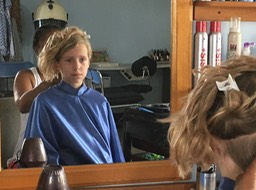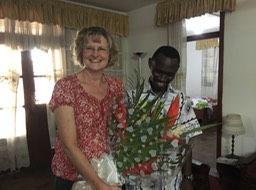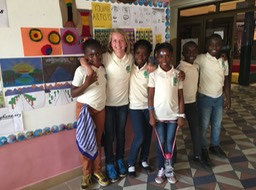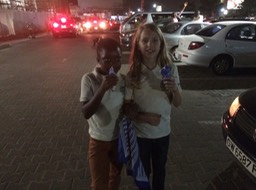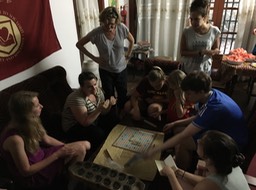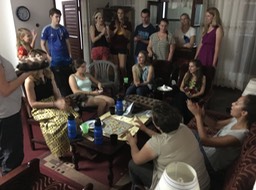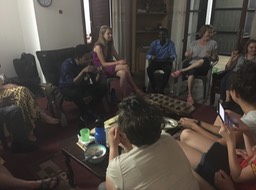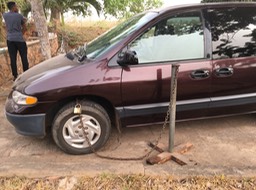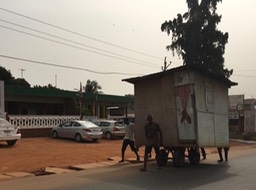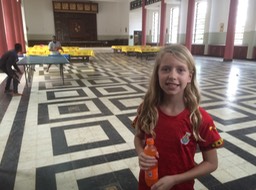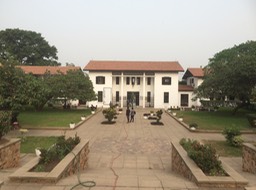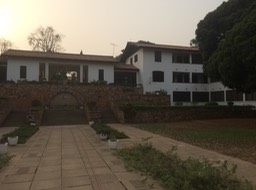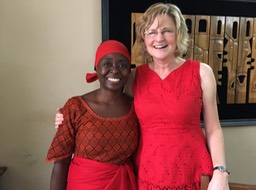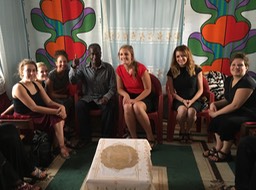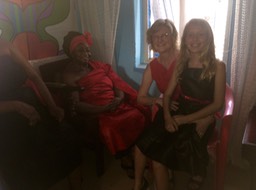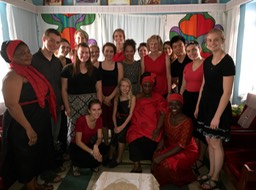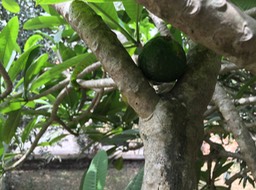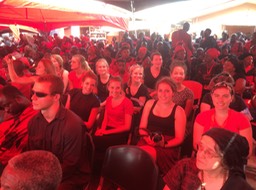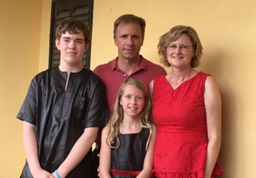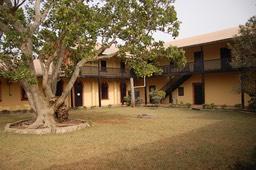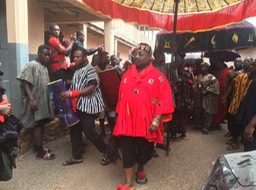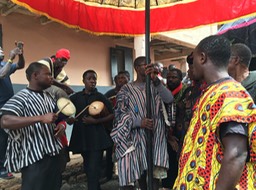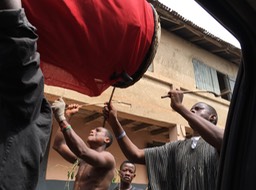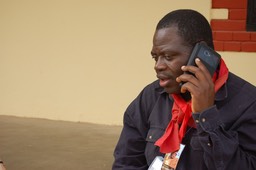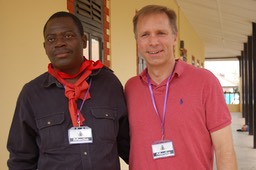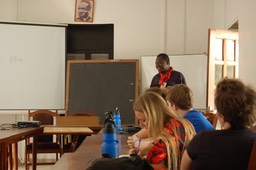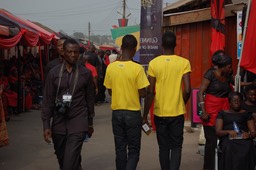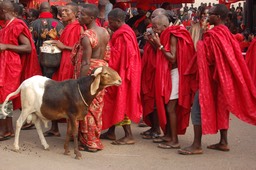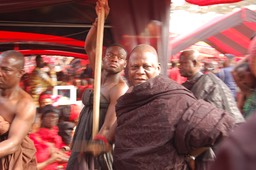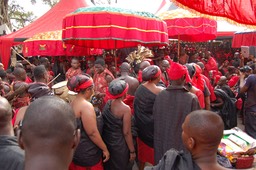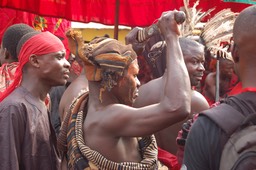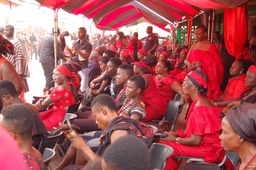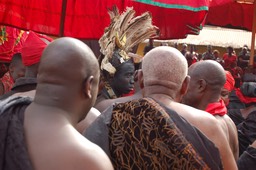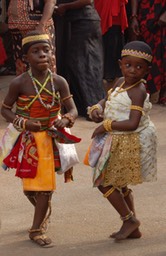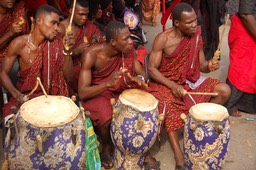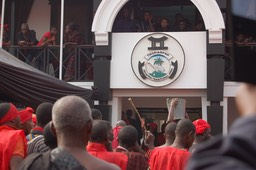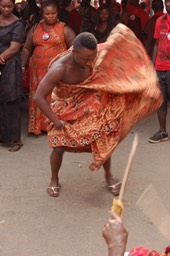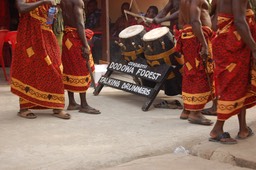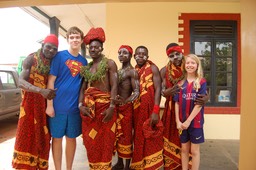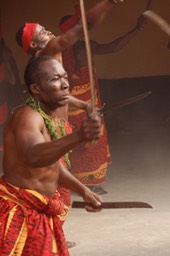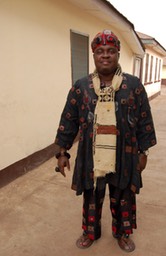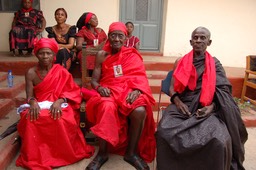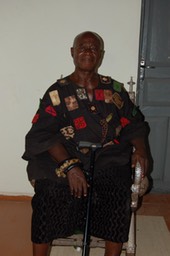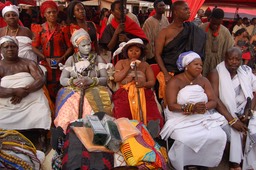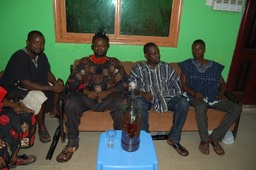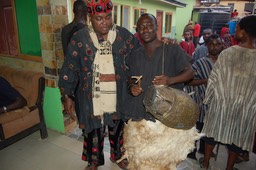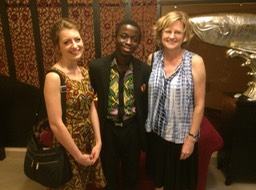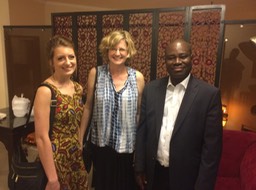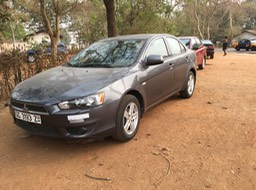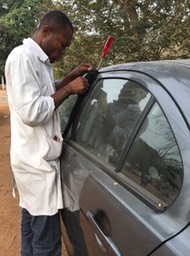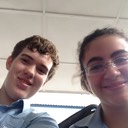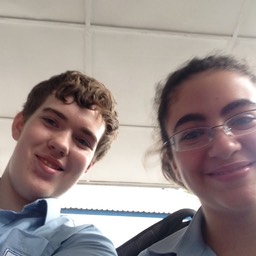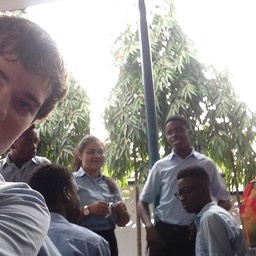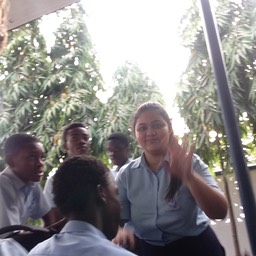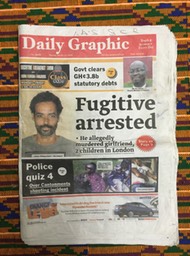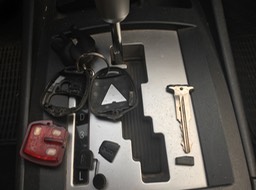Nine months, two homes
Monday Dinner
Today’s big event was our weekly student dinner. Maria and Olivia made tomato soup and grilled cheese sandwiches. Similary to last week, it almost didn’t happen. The soup had a very … interesting flavor until Tyler improved things with a few spices. Tracy was banished from the kitchen for some ill-considered comments.
The main event, though, was a discussion with guests Emily and Joshua. They work in development with different non-governmental organizations (NGOs). (Emily is a former student of Tracy’s.) Emily works at MEST with students interested in software startups and the app economy. Joshua works in agriculture and micro finance, with a side business selling preservative-free dried pineapples. The samples he brought tonight were incredibly tasty!
A few days ago, I wrote about a volleyball game in which Kallie broke her ankle. In the photo below, you can see Kallie’s new blue cast that was installed this morning. She has a few weeks of crutches to endure, after which her ankle should be completely healed.
—Matt
Happy Birthday, Catherine
Catherine enjoyed celebrating her 10th birthday with family presents today, including Moshi beads, squirt guns, Lego, and a doll. Wahab, Catherine’s special friend and president of Commonwealth Hall, brought some ice cream and a card.
It is not easy for a child to have a birthday in a different house, with different routines, away from friends, away from home. But Catherine adapted well and enjoyed the program yesterday and today.
—Matt
Birthday Party
This afternoon, the girls from Catherine’s class helped us celebrate her birthday. They worked on a small craft until everyone arrived. We played the best game, the speed cup stacking game, and “Honey I love you, but I just can’t smile.” Including presents, some dancing, cake, ice cream, and a short walk, we consumed the entire afternoon. The girls had quite a bit of fun, with many smiles and many laughs.
—Matt
Snow Storm
One of Tracy’s students broke her foot playing volleyball in Adenkrebi today. So, Tracy spent much of the afternoon and evening at the doctor and the hospital with her. More appointments tomorrow or Monday.
The medical emergency necessitated taxi rides to and from Roman Ridge for parent-teacher meetings. I was one of the few Form 5 parents to take advantage of the opportunity. Thus, Mark and I had very nice (and somewhat long) discussions with the teachers.
Mark’s friend Kuno came for dinner tonight. They played Mancala and I joined them for Rook.
The big story in Michigan is yesterday's snow storm that closed schools and caused cancellation of 8 and 9 AM classes at Calvin. Sue sent two photos.
—Matt
Preparing
A party to celebrate Catherine’s birthday is planned for Saturday afternoon, and girls from her class are invited. Tracy and Catherine were preparing this evening. The plans include the usual: cake, games, and other fun.
Apparently, Michigan had a strong snow storm last night, and all schools were closed. Sue sent a few photos of our house, which seems a world away from Accra.
—Matt
… And the Sun Was Beating …
Today was again a slow day for the kids and me. Catherine did a homework assignment on Nelson Mandela and Leonardo da Vinci. Mark focused on chemistry. I worked on a paper for the upcoming Ghana Institution of Engineers Annual Conference. The “slow day” reminds me of the opening lines of Paul Simon’s “The Boy in the Bubble,” the first song on Graceland, which turns thirty this year. Thirty! Ouch.
Indeed, “the sun was beating” today as it always does. It seemed all the stronger for the fact that we had three bouts of dumsor, and each time the flat warmed quickly. Tracy was told by the Commonwealth porters that repairs were ongoing to the electrical system, necessitating the outages. When she asked if the new generators would kick in, she was told that there was no fuel. When she asked if she could get fuel, they laughed. (“It is a biiiig generator!”)
Tracy, on the other hand, had a busy administrative day, including gathering eight pieces of paperwork for each students’ resident permit, necessary because their three-month visas expire in the first week of April. One item, University of Ghana IDs for the students, is not yet ready despite repeated promises. The university switched ID vendors recently, causing significant delays. Welcome to Ghana where nothing is ever easy!
—Matt
Taxi Economics
Today was a very slow day. Catherine and Mark each had a bit of homework. I worked on some research and had a Skype meeting. Tracy is teaching her classes this evening.
If I had my way, I would be watching the Barcelona vs. Arsenal Champions League match, but, I can’t. We don’t get it on TV. And, I have been unable to find the game online. With Tracy away, I’m at the flat with the kids.
So, I’ll write a bit about taxi economics.
On one of my many rides earlier this year, I asked a driver about the taxi industry. As I understand it, few drivers own their cars, although many aspire. Instead, most drivers pay a daily “rental” of, say, 50 cedis for a nice car, less for a vehicle in poor condition. Drivers must cover the cost of fuel. Drivers decide fares independently, depending on destination, expected traffic, time of day, etc. Fares are negotiated for each ride.
Some owners require the driver to drop and pick the owner’s kids at and from school, with time between for as many fares as possible. (One such driver comes to Catherine’s school, and he is annoyed when the child is late out of the classroom.)
This system leads to predictable and understandable outcomes. Similar to tenants who take little care of their apartment, many taxi drivers have seemingly little concern for the condition of their vehicles. Nonworking speedometers and other gauges are not unusual. Dents and dings are common, as drivers risk quarter panels and doors to advance in traffic jams.
Furthermore, the economic pressure to obtain fares means that bathroom breaks reduce income. Public (but mostly discreet) urination by taxi drivers is common. For those, like Catherine, who are unaccustomed to the practice, it is an awkward sport to find peeing drivers.
The supply of taxis is high; I have seen more taxis than private cars stopped at some traffic lights. Nonetheless, a driver told me that the occupation is a good moneymaker, considering that the Ghanaian economy is poor and jobs are scarce.
—Matt
Student Dinner
The Calvin students came to the flat for dinner this evening. Tyler made fajitas for us.
Sounds easy, but it wasn’t. Tortillas and fajita sauce had to be purchased from MaxMart near 37. Chicken, spices, and other ingredients were obtained from Shoprite at Accra Mall. Green peppers, tomatoes, and onions were bought at the Night Market.
With all ingredients finally in hand at noon, Tyler began to marinade the chicken. What’s that smell? Ohhhh. Meat for 23 people had gone bad. Bad, as in rotten. Bad, as in stench. (Same story, by the way, for three pounds of ground beef that I purchased for the family at the same store on the same day at the same time.)
We have two theories why it happened. (1) The A/C in Shoprite doesn’t work, and the coolers may not be functioning entirely correctly. Tyler grabbed the chicken from the top of the pile, where it would be most sensitive to the air temperature in the store. (Same for my hamburger.) So, theory number one is that the meat was bad when purchased. (2) Sunday afternoon was very hot, the car is a very dark color, and all groceries were stashed in the boot for the 15-minute ride home due to six passengers. So, theory number two is that the meat spoiled in the trunk on the way home. Not sure which is correct, but it doesn’t much matter because there are no refunds in Ghana for these events. Calvin and the family are out ~75 cedis each!
To solve the problem, Tracy, with Michael, made an emergency run to the MaxMart in East Legon where fresh meat was purchased. All preparation was back on track by 1:30, and everything tasted great by 6:00. Tyler even made an “ice cream” from bananas and Top Choco!
Tracy invited leaders from the adult ministry at Legon Interdenominational Church to join us for the event. See several photos below.
—Matt
Another Playdate
A few quick updates today.
Catherine finished 270-page A Helping of Horrid Henry over the four-day break, her longest book ever.
The mango tree in our backyard is now bearing fruit. None are yet ripe.
Catherine’s classmate Jesse came for a playdate late afternoon. They investigated the pear (avocado) tree and mango tree, cutting the young, unripe fruit open and examining the seeds.
We installed Catherine’s new mosquito net, hoping that it will reduce the number of bites she receives. We were assisted by Norbert, a Commonwealth Hall carpenter, who drilled holes for the hooks in the concrete ceiling. The high ceiling necessitates the strings. You might know she feels like a princess in the bed.
Mark spent much of the afternoon reading, relaxing after the busy-ness of his tournament yesterday.
—Matt
Basketball Tournament
I had a basketball tournament today. I had to wake up at 5:45am, get to school at 7am, and didn’t get back to school until 5pm. We warmed up for the first hour or so and then waited for our first game. We won our first game. But unfortunately lost our next 3. We lost 8-5, then 18-2. In the 3rd place match we lost a heartbreaker 12-13. Here are some pictures from my first game. Dad left after our first game to go home with Catherine. I played a few minutes in the middle two games.
—Mark
I enjoyed what I saw of the basketball tournament today. It was organized chaos, similar to every tournament in the U.S. But, the students all seemed to have fun.
I added a few photos at the end of those selected by Mark. First is the loud speaker that wasn’t silenced while games were ongoing. Second is a photo of a field hockey game. Several schools participated in a hockey tournament at the same venue as the basketball tournament (Ghana INternational School).
Next are a couple photos of Commonwealth president Wahab, Catherine, and friend Khadijah. Wahab took us on a walking tour of Commonwealth today. Fun facts. (1) Commonwealth has 1000 official residents. (2) Commonwealth has 3000 unofficial residents “perching” in the rooms. So, the hall is home to 4000 men, a city unto itself. Wahab was nice enough to show us his room. Wahab took the girls on a walk on the steps in front of Commonwealth.
A meeting was scheduled for tonight among several Vandals and Anas, an investigative reporter and Vandal alumnus. Tracy and Calvin student Abby were to attend. However, some Vandals were holding an illegal “Highlife Festival” in the courtyard of the hall, sponsored by a different Vandal alumnus who is a local beverage distributor. (On our walking tour, Wahab showed me the letter forbidding the event.) The unauthorized noise (music, drumming, dancing) made it impossible to hold the meeting. Wahab came to our flat to explain and apologize. I guess the alum with the money won this battle.
Then, at about 9:30 PM, all power went off on campus. (Mark’s friends elsewhere in Legon and in East Legon are also in the dark; this dumsor is probably quite widespread.) No more Highlife Festival. No more music! So, maybe we’ll be able to sleep!
Oh wait, drumming is ongoing. And, it is becoming increasingly hot and humid without the A/C. Pick your poison: Highlife or heat.
Probably not a good night to sleep, after all.
—Matt
Friends
With Catherine on school holiday, we invited twins and classmates Kheziah and Charles to spend much of the day at our flat. When good friends know how to occupy themselves, the time simply flies. Besides playing inside and out, they studied, read, and listened to Ghanaian music. (The goal: have fun but also make progress on homework assigned for the break.)
Mark had an all-school assembly where the boys and girls basketball team members received a shout-out. His (one and only) tournament is tomorrow.
—Matt
Dancers
While walking home from her office at the Institute of African Studies, Tracy ran across the dancers below. They were practicing some type of routine in front of the water fountain near the library.
I learned today that Mark’s basketball season consists of … Saturday. The team will participate in a single tournament with other international schools in Accra. Similar to the World Cup, the format will be groups of four teams each, with group winners playing for the championship. I hope to attend and take photos.
—Matt
Visas
Student visas for Ghana are valid for three months. So, those who stay the entire semester need to update their documentation. Tracy took the students in three groups of five to the National Identification Authority to obtain the needed extensions. Amazingly, all students were successful!
To round out today’s short post, I have Tracy's photo of the Calvin College classroom at the Institute of African Studies, where students regularly park to study, chat, and use the WiFi between classes.
—Matt
Currency
Mark has been selected to be a member of the Roman Ridge basketball team. His first tournament is an all-day affair on Saturday at the Ghana International School.
Catherine had a fine, but uneventful, day at school today.
Tracy taught her classes this evening.
With no big stories or photos, I’ll provide a slice of Ghanaian life:
The country has ambivalences about its currency, the cedi. The official currency code and sign are GHS and GH , respectively. But, cedis are referenced as “cedi,” “GHS,” “GHC,” or simply “ ” in advertisements and in shops. Colloquially, the currency is referred to as “Ghana,” as in “you owe me twenty Ghana.”
The cedi is divided into 100 pesewas, but people rarely mention pesewas. At an exchange rate of about 4:1 to the USD, single pesewas have little value and are rarely circulated. Indeed, the ten-pesewa coin is the smallest coin I regularly receive. Five-pesewa and one-pesewa coins are treated as a nuisance to be rounded away.
This simplification of the currency allows simplification of speech. Two cedis and forty pesawas is spoken as “two four.” Coconuts cost “one five.” Single pesewas aren’t worth much, so they’re not worth discussing.
Because of the exchange rate, a trip to the grocery can demand close to 500 cedis for a family of four. With the 20 cedi note being the most common in this largely cash-based economy, a fistful of money can be required for a simple run to the store.
—Matt
Ghanaian Music
Catherine and I have spent a lot of time in the car in the last two months, because she is dropped after Mark in the morning routine. So, we’ve had plenty of time to channel-surf the radio, becoming familiar with a bit of the popular music scene in Ghana.
I’m no expert, but I know that the fun of Highlife music has been, for all intents and purposes, replaced by Hiplife, a fusion of Highlife and hip-hop. Two of Catherine’s favoriate songs are Hol’ It by Shatta Wale and Mansa by Bisa Kdei. From those examples, you can tell that Ghanians are in LOVE with autotune.
Tonight, Tracy invited Jemima to join us for the group dinner at our flat. Krista and Sarah improvised chicken pasta primavera under adverse circumstances: the gas cylinder emptied before dinner was ready. They pivoted, finishing the garlic bread in an electric fry pan! Ghana is never uninteresting.
After dinner, Catherine played some of her favorite songs on her iPad. The students had heard and were interested in the songs, but had been unable to locate them on YouTube. High fives and some dancing ensued.
—Matt
An Afternoon Walk
This afternoon, Catherine and I explored the grounds around Commonwealth Hall. I continue to be amazed that a breezy 30-minute walk can provide near-infinite entertainment to a 9-year-old! We came across a flaming red flowering tree. And, we saw a tiny spider. Several downed branches were used as pokers for one purpose or another. There was plenty of jumping to reach flowers and “good” branches. No end of things to be done.
Tracy took a few of her students to Shoprite to purchase groceries for the group dinner tomorrow. Thankfully, no encounters with corrupt cops.
The owner of the offending minivan appeared at our door after church this morning, wanting us to waive the 50 cedi fine and remove the boot from his vehicle. I explained that we only want our parking spot back. We did not install the boot; we did not ask for the boot to be installed; and we are not responsible for collecting the fine. He went to the porters who refused to capitulate. So, he returned to us. Tracy had enough pity to plead his case to the porters who then fell back on the bureaucratic response: “The person who deals with the fees isn’t here today. You’ll have to try again tomorrow.” Fortunately, the car was moved and re-booted, so we have access to the parking space again!
We go back to the daily routine tomorrow. But, Catherine has only 3 days of school this week and none next week due to a mid-term break.
—Matt
Driving While White
We had several interesting events today.
For the first time since our arrival in Accra, everyone in the family got haircuts. We went to Star Unisex Salon in Dzorwulu, where Antoinette “has been styling European Hair for years and comes highly recommended.” It feels great to be a little lighter.
Daniel (from Adenkrebi) brought flowers to our flat. Daniel owns a floral arrangement company that services both individuals and TV and movie productions. The arrangement included ginger, lilies, and “lobster feet.” Not really, but that’s what they look like, and we can’t remember the name.
In mid-afternoon, we went to the Accra Mall. Mark went to see the Deadpool movie while I shopped for groceries and Tracy and Catherine shopped for stuff for the Calvin program. Because we finished long before the movie ended, Catherine, Tracy, and I went home for dinner.
I drove back later (in the dark) to pick Mark.
I was stopped, not once, but TWICE by community police officers who direct traffic in the roundabout at the entrance to the mall; both as I arrived and on my way home. (This is the same spot where I was stopped two weeks ago.) Today, my first offense was approaching the traffic circle in the incorrect lane. My second offense was … there was no second offense. Oh wait, I think I was driving while white.
Both times the officer said that my combination of Michigan driver license and International Driving Permit (IDP) was not legal in Ghana. Both times I was told that I should have visited the DVLA to obtain a 300-cedi endorsement on my license, because I had been in the country for more than one month. Both times I was asked “Do you know this is Ghana?” and told “Things have changed.” Both times I was told I must drive with the officer to the airport police station where my car would be impounded and I would take a taxi home. Both times it was suggested that I could settle the matter now if I pulled over and turned off all lights. Both times, I offered 20 cedis. Both times I was told that 60 cedis would be necessary because there were three officers on duty at the roundabout.
Thankfully, I never felt I was in physical danger. And, as far as I can tell, the stories about the International Driving Permit and the endorsement are both completely untrue. In fact, the DVLA’s own website says that a foreign license with accompanying IDP is valid for up to one year. Even so, I’m 120 cedis poorer. Indeed, being in the right is no help when you are helpless, when you hold none of the cards, when you’re facing a night in jail.
Ugh. It feels absolutely terrible to be racially profiled; no one should believe otherwise. And, as of tonight, both of my children have had the uncomfortable pleasure of seeing their dad bullied by corrupt cops. Welcome to the real world, kids. It can be a very nasty place.
—Matt
Sleepover
Catherine organized a sleepover with classmate Khadijah tonight. When I picked them from school, I took a photo with several classmates next to some of Catherine’s featured art in the school lobby. (l-r: Khadijah, Catherine, Keziah, Paulina, Charles, and Amat.)
In the evening, we went to Chicken Inn for dinner. For dessert, we had Fan Ice.
—Matt
New Dress
When Catherine and I came home from school today, the Commonwealth seamstress, whose shop is next door to our flat, motioned for us to come. (In Ghana, the “come over here” motion is a repeated, palm-down grasping motion.) Diana had finised Catherine’s new dress, one for which Catherine selected the fabric herself. (See photo below.)
Mosquito bites are visible on her upper right arm. The mosquitos entered the flat during yesterday's student dinner and attacked while she slept. Today, I bought hooks to install a mosquito net above her bed. The Commonwealth Hall carpenter will come soon to install the hooks in the concrete ceiling.
Mark’s school had a half-day today. He thought there would be a friendly basketball game against another school, but that didn’t happen. Indeed, we thought he would have basketball four days this week, but due to a variety of circumstances, there was only one practice that he attended. With the first tournament next weekend and team selection not yet announced, I’m starting to wonder about commitment and quality. We’re used to the idea that few things are organized here as in the U.S., so this is not terribly surprising. But, still…
—Matt
Student Dinner
Tracy's students came to our flat for dinner this evening, and we served West African groundnut stew. We took advantage of the time together to celebrate Abby’s 22nd birthday! Members of Commonwealth Hall’s student executive team joined us, too, including Wahab, Shadow, Teddy, and Rufus. Photos below.
We’re grateful to my mom who successfully shipped an important package to us today. We expect it in a couple days. Thanks, mom!
—Matt
First Class
For the last two days, a minivan has been parked in our driveway. The porters at Commonwealth Hall have attached a boot to the left front wheel. Not sure if it will have the desired effect.
When I was driving Catherine home from school, we saw a building relocation in Okponglo—by hand! (I’m unsure on whether it was a house or a store.) I snapped a photo, over the protestation of the lead mover who yelled “What have I done?" (I have no idea why he was so agitated.) As I mentioned before, there is no shortage of entertainment on the roads.
Before Tracy taught her first class(es) from 6-8 this evening, she and Catherine searched for food at the Commonwealth dining hall. They found the hall, but it does not serve dinner, only breakfast and lunch. Along the way, they bought an Orange Fanta and took a couple photos of the Commonwealth courtyard.
—Matt
Great Work!
We nearly had our first day where everything went right. It was so close. Tracy pushed our luck by going to the University of Ghana Guest Centre to make a reservation for a colleague who will visit in March. But, nobody was at the reception desk. We’ll try again tomorrow.
Catherine earned two certificates for “Great Work!” during assembly at school: one each for literacy and numeracy unit tests. She was justifiably proud.
—Matt
Recovery Day
We took a recovery day today. Catherine and I shopped for groceries. Mark tried to watch the Chelsea-Manchester United game in two places and failed. Both the pool restaurant and the Commonwealth Hall TV room were too crowded. He needs to arrive at the venue earlier when Chelsea play.
I’ll share two of Mark’s photos from the weekend. The first is a tropical flower. (My apologies to everyone I am offending for not knowing its name.) And, a good photo of a Rainbow Lizard.
School begins again tomorrow.
—Matt
Funeral, Day 2
The surprises started early today.
At 6 AM, the students and our family attended the Christian prayer service to start the funeral day for deceased Paramount Chief Oseadeeyo Addo Dankwa III. Afterward, Tracy, the students, and Mark viewed the body. (I had done so yesterday, and Catherine was too squeamish.)
Thereafter, we took breakfast at the Akrofi Christaller Institute. Jemima, the receptionist at the University of Ghana’s Institue of African Studies surprised us with a visit. Only, we didn’t know it was her. She was dressed differently, like royalty. Which she is, being the niece of the deceased paramount chief! Last week, she told Tracy she would be attending the funeral, but we had no idea in what capacity.
Jemima invited us to the queen mother’s house where we met the younger brother of the deceased chief and the Queen Mother’s daughter. (The queen mother, herself, is frail and was unable to receive our delegation.) Catherine was granted the amazing privilege of sitting on the edge of the stool beside the Queen Mother’s daughter, and I took the photo of everyone assembled. The Queen Mother’s daughter invited us for buffet lunch at her mother’s home, and Tracy accepted on behalf of the Calvin delegation. We gratefullly acknowledged the home’s hospitality with a small gift. But, on Tracy’s birthday, her best gift was the opportunity to meet royalty.
Tracy organized another lecture on funerals, which she attended with the students after our visit to the Queen Mother’s home. While Mark read, Catherine and I played “find the limes.” I would hide two limes in a tree, and she would climb to seek.
After the lecture, Tracy and the students attended the Christian funeral service as guests of the Akrofi Christaller Institute. As such, they were privileged to sit under the black and red awnings. After the lunch at the Queen Mother’s home, Mark, Catherine, and I went back to Accra while Tracy and the students stayed in Akropong. Tracy attended the cultural service in the late afternoon.
Check back here occasionally, as I might post more photos when I have access to Tracy’s phone. But, for now, here’s a family photo in our funeral finery.
—Matt
Red
In the morning, we travelled to Akrofi Christaller Institute in Akropong. Tracy and the students have been here before. But, this was the first time that Catherine, Mark, and I visited.
Our destination was the funeral of Paramount Chief Oseadeeyo Addo Dankwa III. On our way into Akropong, we were routed away from the main road to a back alley, just as a chief’s procession made its way to the center of town. Traffic in Accra is congested, but this was something else altogether: a narrow alley with drumming and dancing echoing wall to wall! It was intense, causing both Mark and Catherine some discomfort.
Samuel was our guide and cultural interpreter. Although he is a researcher at the university, he secured a 30-cedi media badge from the palace, allowing him to take photos wherever and whenever he wished. I got one, too, claiming to be a reporter for the illustrious Calvin College Chimes newspaper. For a day, we were members of the press.
After lunch, Samuel gave a lecture on chieftancy and funerals filled with fascinating information. Royalty is passed maternally, not paternally. 70% of Ghanians support the institution of the chieftancy. There is a hierarchy, imposed by British colonialists, with a king above paramount, divisional, and sub chiefs. He estimates that there are 500,000 chiefs in Ghana, because every town has one. However, only about 100,000 are gazetted (on the offical government roll of chiefs). All decorations and dress for funerals in southern Ghana are red and black: black for mourning and red signifying importance of occasion. (It is not clear how these guys hawking MTN minutes got in!) A goat must be slaughtered before the next chief can be installed. For some groups, discharging firearms into the air is a (very loud) statement of willingness to protect their chief, littering empty shells everywhere. (No danger, just lots of noise!) Other ways to protect a chief include holding an umbrella over his head and calling attention to the fact that you’re carrying a sword.
Above all, funerals are for the living, not the dead. They are an occasion to forge new, re-new, or reinforce relationships. And, they are peaceful: enemies are obliged to treat each other well as they converge for the event.
Samuel claims that one can learn much about the history and current politics of a region by understanding who attends its funerals and why. You must observe the proceedings, which unfold somewhat like a frenzied combination of an American pre-funeral visitation and a Memorial Day parade. Much of the assembled crowd watches the events beneath red and black awnings. And, of course, there is plenty to see: An executioner (in headdress) who demands money or your “life.” Visiting chiefs from “all over.” Dancers. Drummers. And politicians.
Everyone’s destination is the palace where the Paramount Chief’s body lies in state. There were dancers at the entrance.
We encountered a delegation from Dodowa several times throughout the day. Our first meeting was at the Akrofi Christaller Institute, where they were staging for their afternoon of drumming and dancing. We met them again later as they performed, in an alley, for no one in particular, oblivious to our presence, in the sheer joy of percussion and movement.
Tracy had asked me to get a photo of a chief dressed in a particular style of clothing. After watching the Dodowa delegation, Samuel and I introduced ourselves to a chief (Nana) who graciously allowed us to take his photo. Upon completing a few pleasantries, we learned that he works in the US and travels to Ghana twice yearly, always returning to his IT job in Virginia. His people are warriors, as you can see from the rifles decorating his headwear. He was very eager to show us around.
The next two hours were unbelievable. Nana took Samuel and me to his palace where we met diviners. We saw the caretaker chief, ruling until the next chief is installed. He introduced us to dignitaries. We paid our respects to the deceased chief at the palace. (His body was lying on a bed in a gorgeous, gold-decorated, air-conditioned room.) Nana bought us a drink and answered a few of my questions between arguments with other chiefs about migration patterns and past wars. We visited the palace of a chief under him where we were offered and accepted the “local beverage,” a mixture of whiskey and strong herbs. He showed us a special drum made from the skin of a human back. And, we met the chief over him who is responsible for organizing the entire funeral. (I hope I have most of these details correct; it was all quite a blur!) As we walked through crowds, Nana would say (in Twi): “Make way; humans coming through!”
Several people remarked that this funeral is a once-in-a-lifetime event. If that is true for Ghanians, it is doubly true for me. When I look back on today, I’ll remember Samuel’s companionship. I’ll remember Nana’s generosity and hospitality. I’ll remember the drumming. I’ll remember the dancing. And, I’ll remember the red. Everything was red!
—Matt
Travelling
We and the semester students are headed to Akropong tomorrow. Destination: the funeral of Paramount Chief Oseadeeyo Addo Dankwa III. Samuel will be our guide and cultural interpreter.
The dress code is red and black, so, Catherine, Mark, and Tracy all had new clothing made by Diana, seamstress at Commonwealth Hall.
Updates to the blog may be less frequent in the coming days, depending on internet availability.
—Matt
Political Event
Tracy and her student Bethany attended a political rally at the invitation of the President of Commonwealth Hall (Wahab).
—Matt
You Can’t Make This Up
• Mitsubishi designs a Lancer ignition switch from which it is difficult to extract keys.
• An earlier Ghana semester program director buys a Lancer with a computerized access control key fob.
• Someone loses the spare key to the Lancer.
• Two days ago, I use extra torque to remove the key and the fob falls apart.
• Yesterday morning, I carefully put the key fob back together and start the car. (However, it is insecure and vulnerable to future destruction.)
• I take the car to CFAO Motors to get an oil change and a new key.
• Just before I arrive, the technician departs for the workshop where the key-cutting machine is located. The next trip to the workshop is scheduled for late afternoon.
• I decide against making the new key when informed that it would be ready only after I need to pick the kids from school.
• Yesterday evening, Tracy decides to visit a cat.
• Tracy neglects to tell me that she’ll drive. (I assumed she would be visiting the the cat that is within walking distance.) She doesn't tell me she’s leaving the flat. She doesn’t take her phone.
• I realize that Tracy is gone and reach for my phone to warn her about the fragile key. But her phone is on the nightstand in the bedroom.
• Tracy decides to stop at the Night Market for some ice cream.
• Tracy tries to remove the key from the ignition, thereby destroying the key fob—again. The all-important chip falls to the floor of the Lancer, and the metal portion of the key remains in the ignition. She can’t remove the key from the ignition, she can’t put the key fob back together, she can’t call to ask what should be done.
• Tracy decides to lock and exit the car with the metal portion of the key in the “accessories” position and the plastic parts of the fob in her hands. She takes a taxi back to the flat, assuming (hoping?) that I can put everything right. But, what remains of the key fob is ineffective for locking or unlocking the car doors, because the key is still in the ignition.
• I dispatch (angrily) to the Night Market in the dark, only to verify that, indeed, we are so screwed!
So, as of 8:00 PM yesterday evening, a chain of events years in the making led to us being locked out of the car with our only key in pieces, many of which were completely unreachable inside the Lancer!
• This morning, I call CFAO Motors who sends a technician to the Night Market with thief’s tools and jumper cables.
• I walk to the Night Market to re-join the Lancer. Along the way, I take a selfie with a massive termite mound.
• Stanley (our hero!) arrives and carefully and successfully breaks into the Lancer.
• I find the chip on the floor, remove the key from the ignition, put the fob back together, start the car, and follow Stanley to CFAO Motors.
• I wait the entire day at CFAO Motors for an oil change and a new key, all the while watching Premier League highlights at full volume in a very warm and crowded lounge.
This chain of events could provide the structure for an Avant-Garde (or Coen Brothers) film. You can’t make this stuff up.
—Matt
Friends
These are are a few pictures I took of me and my friends after school today. We were all waiting to be picked up and so were just hanging around. So basically everyone’s happy and smiling and just all around having a good time.
The car is broken again. Before being able to be warned not to take the car, mom took the car because she wanted to see a cat with Catherine and as she was about to come home she broke the key again (it was still semi broken and shouldn’t have been used till fixed.) It was an accident though and so we’re just moving on. (On foot since we don’t have the car haha.) So we’ll be taking taxis to school again like we did for our first two weeks being here. And my friend Kwami, who you’ll see in these pictures, thankfully, God bless, is able to take me home since he lives only about 5 minutes away. We’ll see how this goes and hopefully we’ll have the car back soon.
—Mark
Busted Key, Broken-down Car
Later this semester, Tracy wants to re-read the famous novel Things Fall Apart by Nigeran writer Chinua Achebe. Besides being the title of the novel, it could be the title of our day!
One of Catherine’s homework assignments was to identify parts of a newspaper. For that, she needed a hardcopy, but we had none at the flat. There was, however, a old Daily Graphic at Tracy's office. So I dispatched to the Institute of African Studies to fetch it. Upon arrival, I turned off the ignition and tried to remove the key. It wasn’t coming out, so I applied a little more torque, as I had done dozens of times before. Today, the key fell apart!
I collected the pieces, fetched the paper, returned to the car, inserted the now-stubby key, and turned. Nothing!
4:30. Need to pick up Mark.
For unknown reasons, there is no second key. So, Tracy and Catherine walked down from the flat to deal with the broken-down car while I travelled to Roman Ridge in a taxi. (Yes, back to taking taxis!)
Tracy enlisted the assistance of the Institute’s drivers who, after investigating, declared an electrical fault. There was some discussion that the busted key is related to the broken-down car.
We’ll try again tomorrow. (After using a taxi to bring the kids to school, of course.)
—Matt
Rules of the Ghanaian Road
Taxi drivers can do anything they want. (At any time.)
Motorcycles are exempt from traffic signals. (And lane lines.)
Helmet? No helmet? Your choice.
Beware of lorry drivers wearing helmets!
It is OK to drive on the left side of the road. (Even though Ghana is a right-hand-drive country.)
It is perfectly acceptable to make an illegal move so long as another vehicle runs interference for you.
If they don’t move immediately, it’s OK to honk. (If they do move immediately, it’s still OK to honk.)
It is OK to drive on the sidewalk. (Especially when the roadway is blocked.)
Flat tire? Why pull over? The lane is your garage.
Chaos is desirable. (It slows traffic and compels turn taking.)
It is unacceptable to lose your patience. (At least, very few people seem to.)
Stop signs? Who needs stop signs!
There is no maximum stacking height atop tro-tros.
Working traffic lights: optional.
There are four legal options for entering a jammed lane:
• The “I’m too nice/timid/inexperienced.” Put on your turn signal. Wait (less time than you’d expect). A taxi driver will flash brights at you. Move ahead.
• The “I’ll try to be nice about it, but you really must let me in.” Put on your turn signal. Wave your hand. Make a motion indicating your intention. Move ahead. (No need to wait for acknowledgement.)
• The “Tantrum.” Move to completely snarl traffic in a different lane. Wait briefly for drivers in your destination lane to accommodate you. (They will, because they empathize with the drivers in the lane you’re blocking.) Move ahead. (No need to apologize.)
• The “I don’t care what you think.” Put the corner of your bumper between two cars. Push.
—Matt
